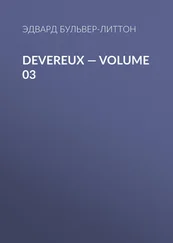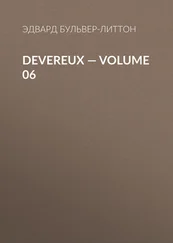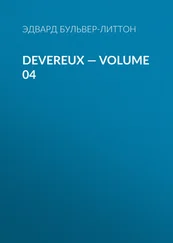Эдвард Бульвер-Литтон - Devereux — Complete
Здесь есть возможность читать онлайн «Эдвард Бульвер-Литтон - Devereux — Complete» — ознакомительный отрывок электронной книги совершенно бесплатно, а после прочтения отрывка купить полную версию. В некоторых случаях можно слушать аудио, скачать через торрент в формате fb2 и присутствует краткое содержание. Жанр: foreign_prose, История, literature_19, Европейская старинная литература, foreign_edu, foreign_antique, на английском языке. Описание произведения, (предисловие) а так же отзывы посетителей доступны на портале библиотеки ЛибКат.
- Название:Devereux — Complete
- Автор:
- Жанр:
- Год:неизвестен
- ISBN:нет данных
- Рейтинг книги:5 / 5. Голосов: 1
-
Избранное:Добавить в избранное
- Отзывы:
-
Ваша оценка:
- 100
- 1
- 2
- 3
- 4
- 5
Devereux — Complete: краткое содержание, описание и аннотация
Предлагаем к чтению аннотацию, описание, краткое содержание или предисловие (зависит от того, что написал сам автор книги «Devereux — Complete»). Если вы не нашли необходимую информацию о книге — напишите в комментариях, мы постараемся отыскать её.
Devereux — Complete — читать онлайн ознакомительный отрывок
Ниже представлен текст книги, разбитый по страницам. Система сохранения места последней прочитанной страницы, позволяет с удобством читать онлайн бесплатно книгу «Devereux — Complete», без необходимости каждый раз заново искать на чём Вы остановились. Поставьте закладку, и сможете в любой момент перейти на страницу, на которой закончили чтение.
Интервал:
Закладка:
THE AUTOBIOGRAPHER’S INTRODUCTION
MY life has been one of frequent adventure and constant excitement. It has been passed, to this present day, in a stirring age, and not without acquaintance of the most eminent and active spirits of the time. Men of all grades and of every character have been familiar to me. War, love, ambition, the scroll of sages, the festivals of wit, the intrigues of states,—all that agitate mankind, the hope and the fear, the labour and the pleasure, the great drama of vanities, with the little interludes of wisdom; these have been the occupations of my manhood; these will furnish forth the materials of that history which is now open to your survey. Whatever be the faults of the historian, he has no motive to palliate what he has committed nor to conceal what he has felt.
Children of an after century, the very time in which these pages will greet you destroys enough of the connection between you and myself to render me indifferent alike to your censure and your applause. Exactly one hundred years from the day this record is completed will the seal I shall place on it be broken and the secrets it contains be disclosed. I claim that congeniality with you which I have found not among my own coevals. Their thoughts, their feelings, their views, have nothing kindred to my own. I speak their language, but it is not as a native: they know not a syllable of mine! With a future age my heart may have more in common; to a future age my thoughts may be less unfamiliar, and my sentiments less strange. I trust these confessions to the trial!
Children of an after century, between you and the being who has traced the pages ye behold—that busy, versatile, restless being—there is but one step,—but that step is a century! His now is separated from your now by an interval of three generations! While he writes, he is exulting in the vigour of health and manhood; while ye read, the very worms are starving upon his dust. This commune between the living and the dead; this intercourse between that which breathes and moves and is , and that which life animates not nor mortality knows,—annihilates falsehood, and chills even self-delusion into awe. Come, then, and look upon the picture of a past day and of a gone being, without apprehension of deceit; and as the shadows and lights of a checkered and wild existence flit before you, watch if in your own hearts there be aught which mirrors the reflection.
MORTON DEVEREUX.NOTE TO THE PRESENT EDITION (1852)
If this work possess any merit of a Narrative order, it will perhaps be found in its fidelity to the characteristics of an Autobiography. The reader must, indeed, comply with the condition exacted from his imagination and faith; that is to say, he must take the hero of the story upon the terms for which Morton Devereux himself stipulates; and regard the supposed Count as one who lived and wrote in the last century, but who (dimly conscious that the tone of his mind harmonized less with his own age than with that which was to come) left his biography as a legacy to the present. This assumption (which is not an unfair one) liberally conceded, and allowed to account for occasional anachronisms in sentiment, Morton Devereux will be found to write as a man who is not constructing a romance, but narrating a life. He gives to Love, its joy and its sorrow, its due share in an eventful and passionate existence; but it is the share of biography, not of fiction. He selects from the crowd of personages with whom he is brought into contact, not only those who directly influence his personal destinies, but those of whom a sketch or an anecdote would appear to a biographer likely to have interest for posterity. Louis XIV., the Regent Orleans, Peter the Great, Lord Bolingbroke, and others less eminent, but still of mark in their own day, if growing obscure to ours, are introduced not for the purposes and agencies of fiction, but as an autobiographer’s natural illustrations of the men and manners of his time.
And here be it pardoned if I add that so minute an attention has been paid to accuracy that even in petty details, and in relation to historical characters but slightly known to the ordinary reader, a critic deeply acquainted with the memoirs of the age will allow that the novelist is always merged in the narrator.
Unless the Author has failed more in his design than, on revising the work of his early youth with the comparatively impartial eye of maturer judgment, he is disposed to concede, Morton Devereux will also be found with that marked individuality of character which distinguishes the man who has lived and laboured from the hero of romance. He admits into his life but few passions; those are tenacious and intense: conscious that none who are around him will sympathize with his deeper feelings, he veils them under the sneer of an irony which is often affected and never mirthful. Wherever we find him, after surviving the brief episode of love, we feel—though he does not tell us so—that he is alone in the world. He is represented as a keen observer and a successful actor in the busy theatre of mankind, precisely in proportion as no cloud from the heart obscures the cold clearness of the mind. In the scenes of pleasure there is no joy in his smile; in the contests of ambition there is no quicker beat of the pulse. Attaining in the prime of manhood such position and honour as would first content and then sate a man of this mould, he has nothing left but to discover the vanities of this world and to ponder on the hopes of the next; and, his last passion dying out in the retribution that falls on his foe, he finally sits down in retirement to rebuild the ruined home of his youth,—unconscious that to that solitude the Destinies have led him to repair the waste and ravages of his own melancholy soul.
But while outward Dramatic harmonies between cause and effect, and the proportionate agencies which characters introduced in the Drama bring to bear upon event and catastrophe, are carefully shunned,—as real life does for the most part shun them,—yet there is a latent coherence in all that, by influencing the mind, do, though indirectly, shape out the fate and guide the actions.
Dialogue and adventures which, considered dramatically, would be episodical,—considered biographically, will be found essential to the formation, change, and development of the narrator’s character. The grave conversations with Bolingbroke and Richard Cromwell, the light scenes in London and at Paris, the favour obtained with the Czar of Russia, are all essential to the creation of that mixture of wearied satiety and mournful thought which conducts the Probationer to the lonely spot in which he is destined to learn at once the mystery of his past life and to clear his reason from the doubts that had obscured the future world.
Читать дальшеИнтервал:
Закладка:
Похожие книги на «Devereux — Complete»
Представляем Вашему вниманию похожие книги на «Devereux — Complete» списком для выбора. Мы отобрали схожую по названию и смыслу литературу в надежде предоставить читателям больше вариантов отыскать новые, интересные, ещё непрочитанные произведения.
Обсуждение, отзывы о книге «Devereux — Complete» и просто собственные мнения читателей. Оставьте ваши комментарии, напишите, что Вы думаете о произведении, его смысле или главных героях. Укажите что конкретно понравилось, а что нет, и почему Вы так считаете.












